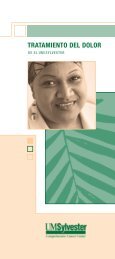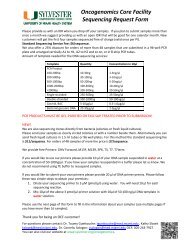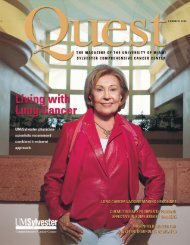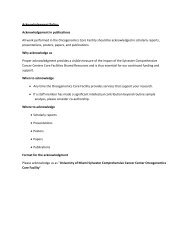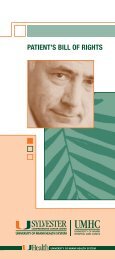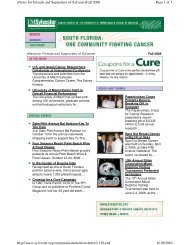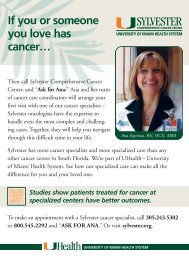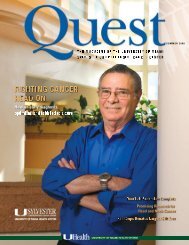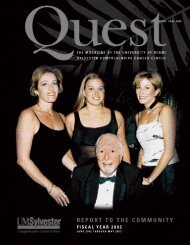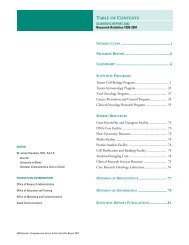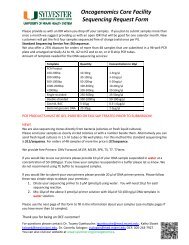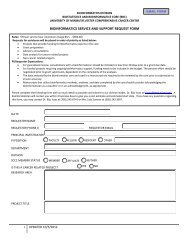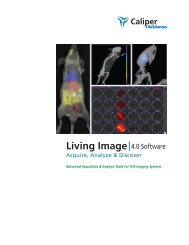SCIENTIFIC REPORT 2004 - Sylvester Comprehensive Cancer Center
SCIENTIFIC REPORT 2004 - Sylvester Comprehensive Cancer Center
SCIENTIFIC REPORT 2004 - Sylvester Comprehensive Cancer Center
Create successful ePaper yourself
Turn your PDF publications into a flip-book with our unique Google optimized e-Paper software.
I N T R O D U C T I O N A N D P R O G R E S S R E P O R T<br />
professor of Medicine at the University of<br />
Miami School of Medicine, is leading the<br />
investigation. ADI-PEG is a targeted approach<br />
to fighting cancer, which focuses on enzymes<br />
that are very common in all melanoma cell<br />
lines. ADI-PEG attaches to arginine, an amino<br />
acid in the blood, which malignant tumor cells<br />
rely on to grow. The ADI-PEG degrades the<br />
arginine, making it impossible for the cancer<br />
to synthesize and use. This has significant advantages<br />
over previous treatments. Because<br />
this treatment is not chemotherapy, it can be<br />
administered as an outpatient treatment with<br />
a single weekly injection, rather than requiring<br />
a hospital stay or a long infusion.<br />
• Sheldon Greer, Ph.D., professor of Microbiology<br />
and Immunology at the University of<br />
Miami School of Medicine, has made many<br />
important discoveries in the course of his distinguished<br />
scientific career. An experimental<br />
radiosensitizer developed by Dr. Greer will<br />
shortly enter a phase I clinical trial for head<br />
and neck cancer patients. Cytochlor, developed<br />
by Dr. Greer and NCI-approved for patient<br />
trials to be conducted by Luis E. Raez, M.D.,<br />
F.A.C.P., enters tumor cells and renders them<br />
much more susceptible to low-dose radiation.<br />
This enables a much higher success rate against<br />
cancer cells and the potential for reducing<br />
patient side effects.<br />
• Theodore J. Lampidis, Ph.D., professor of Cell<br />
Biology and Anatomy, has discovered one way<br />
to attempt to tackle the problem of targeting<br />
non-dividing tumor cells that are resistant to<br />
chemotherapy and/or radiation. He has<br />
found that slow dividing cells located in the<br />
middle of the tumor grow under low oxygen<br />
conditions (hypoxia) and differ in their metabolism<br />
of glucose from normal cells in the body.<br />
To exploit this difference, he has shown that by<br />
simply using a false sugar—2-Deoxyglucose<br />
(2-DG)—instead of glucose, the slow growing<br />
tumor cells take up more 2-DG than the slow<br />
growing normal cells and consequently starve to<br />
death. Luis E. Raez, M.D., F.A.C.P., and Shou-<br />
Ching Tang, M.D., Ph.D., have initiated the<br />
first clinical trials in lung cancer patients using<br />
this highly novel approach.<br />
• A unique peptide (IEP11) was defined by<br />
Diana M. Lopez, Ph.D., professor of Microbiology<br />
and Immunology and leader of UM/<strong>Sylvester</strong>’s<br />
Tumor Immunology Program. This<br />
peptide appears to elicit a powerful immune<br />
response in mice that have been injected with<br />
various types of tumor cells. Subsequent studies<br />
indicate that those animals that were “IEP11<br />
immunized” were found to form tumors at a<br />
greatly reduced rate. This suggests that the<br />
peptide could serve as an adjuvant treatment to<br />
enhance many cancer vaccine therapies in the<br />
treatment of a variety of tumor types. Viragen,<br />
a new biotechnology company located in<br />
Plantation, Florida, will collaborate with the<br />
University’s team to develop the peptide for<br />
use in human clinical trials.<br />
• Azorides Morales, M.D., chairman of Pathology<br />
at the University of Miami School of Medicine,<br />
has devised a way to use microwave radiation<br />
to reduce tissue pathology processing from<br />
one day to about one hour. The Jackson Health<br />
System and UM/<strong>Sylvester</strong> are the only institutions<br />
in the world offering this technique. This<br />
is not frozen section pathology, but accelerated<br />
tissue processing patented by the University of<br />
Miami, which may revolutionize the way tissues<br />
are processed, while allowing pathologists to<br />
extract vital molecular information in ways not<br />
previously possible.<br />
• Eckhard R. Podack, M.D., Ph.D., has developed<br />
a new antibody that can be used to target<br />
Hodgkin’s and non-Hodgkin’s lymphoma cells.<br />
The development of this novel antibody called<br />
SGN30, which identifies a protein on the surface<br />
of the cancer cells and “labels” the cells<br />
with an antibody therapy, allows the immune<br />
system to target them for destruction. This is a<br />
more “intelligent” treatment and should have<br />
fewer side effects than with traditional chemotherapy.<br />
Joseph D. Rosenblatt, M.D., and<br />
iv<br />
UM/<strong>Sylvester</strong> <strong>Comprehensive</strong> <strong>Cancer</strong> <strong>Center</strong> Scientific Report <strong>2004</strong>



